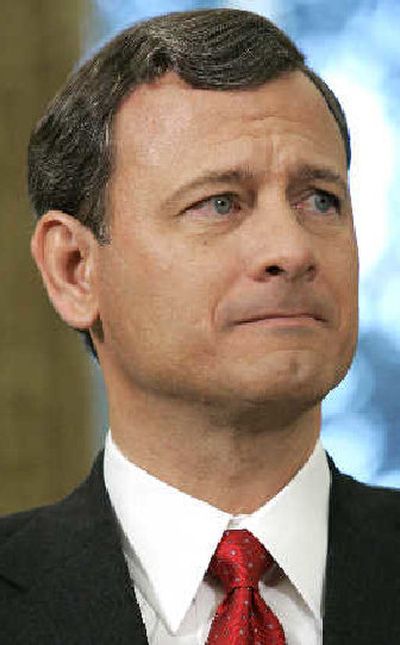Roberts likely would temper views

WASHINGTON – It would be difficult to overstate the historical significance of Monday, when John G. Roberts is sworn to testify at Senate hearings on his nomination to become the nation’s 17th chief justice.
If confirmed, which is a near certainty, Roberts will be the first to replace a justice he clerked for on the court. At age 50, he’ll be the second-youngest chief justice in history, behind only John Marshall, whose tenure established the court’s broad authority. And Roberts will be the first new justice on the court in more than 10 years – a record for the modern era.
But how will Roberts affect the court and the nation’s legal future? The answer to that question is still being hotly debated, and it’s one that won’t be resolved over the course of the hearings or perhaps within his first few years on the court.
The fact that Roberts will join the court as its chief could require him to constrain his views on individual issues and cases in favor of developing the authority to lead the other justices on the court.
“It’s a little like a sophomore coming in to be captain on a team with juniors and seniors,” said legal historian David Garrow. “In the long run, he could be incredibly influential and could have significant influence over the court and the law. But he will be purposely slow to develop that, because you have to establish credibility first. And you do that by building consensus, not by filing lone dissents.”
Roberts will join a court on which the most junior justice has 10 years experience. It’s a tight-knit group that’s been fond of citing its unusual collegiality despite its diverse views.
Roberts will need to gain the other justices’ confidence before doing anything else, Garrow and others said. That may mean shelving some of the brashness he showed as a young lawyer in the Reagan White House and, to a lesser extent, as a federal judge.
“A brand-new chief justice can’t afford to make fun of ‘hapless toads’ in lone dissents,” Garrow said, referring to a Roberts opinion that mocked some provisions of the Endangered Species Act.
Several experiences in Roberts’ past suggest that he may be well suited to developing his influence over the other justices.
Over more than two decades in Washington, he’s established himself as a top-notch lawyer and widely respected judge. He argued 39 cases in front of the court, as a private appellate attorney and a deputy solicitor general, winning 25 of those cases.
He may be one of the most accomplished jurists to ever join the court. The key will be translating that experience and skill in the law into another quality: collegial persuasion.
“I think he could be quite good at forging consensus in cases where the justices generally agree about what to do, but may disagree about how to do it,” said Evan Caminker, the dean of the University of Michigan Law School who was a clerk for former Supreme Court Justice William Brennan.
Caminker cited one such case as a good example: In the dispute over the release of Oval Office tape recordings from the Nixon White House, Chief Justice Warren Burger was able to produce a unanimous decision that had more credibility than a splintered ruling would have.
Similarly, “Roberts would be quite skillful at taking disparate views that all seem to go in one direction and crafting a clear path that everyone could join,” Caminker said.
“That’s different than saying he’d pull people to the right or the left.”
On substantive questions in cases that could move the court in a more conservative or liberal direction, Roberts will face a very different challenge, court watchers say.
Roberts brings, by almost any measure, a solidly conservative background to the job. Once he decides to make his mark on issues such as civil rights, gender discrimination and the environment, most expect him to try to move the court to the right.
But to do that, he’ll need to woo the moderate wing of the court, now embodied primarily in Justice Anthony Kennedy.
Kennedy was a Reagan appointee whose first years on the court supplied a reliable vote for the court’s conservative movement, led by Supreme Court Chief Justice William Rehnquist, who died Sept. 3, and retiring Justice Sandra Day O’Connor.
But in recent years, Kennedy has developed a strong passion for civil liberties and has become a driving force behind decisions that have disappointed social conservatives. Kennedy was key in rulings that struck down prayer at public school graduations, dramatically expanded legal protection for gays and eliminated the death penalty for juveniles.
With Rehnquist and O’Connor gone, Kennedy could be poised to take greater control of the court’s direction.
“The question is whether Roberts will be able to win him over when he needs winning over for the things conservatives want,” said Nathaniel Persily, a constitutional expert and law professor at the University of Pennsylvania.
Theodore Ruger, a law professor at University of Pennsylvania, said Roberts would face other challenges as chief justice that should be explored during his hearings. As head of the federal judiciary, he will have administrative responsibility over 1,200 federal judges and a $5.43 billion budget.